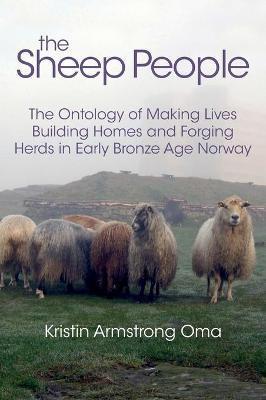The Sheep People: The Ontology of Making Lives, Building Homes and Forging Herds in Early Bronze Age Norway

The Sheep People: The Ontology of Making Lives, Building Homes and Forging Herds in Early Bronze Age Norway
The overarching aim of The Sheep People is to examine what happens to the understanding of past societies when animals are perceived as sentient beings, agents with the ability to impact human lives. Not only are the agentive powers and potential of animals recognised, but also how this shaped prehistoric societies. Throughout, animals are considered as themselves, not as props, tools or consumables for human societies. A thorough review of recent research that supports the agential potential of animals from Human-Animal Studies and the social sciences, as well as ethology, biology and neurology is given, and discussed in light of the archaeological case study.
In the Early Bronze Age in northern Europe, a transition from building two-aisled to three-aisled longhouses as the primary farm dwelling took place. In Rogaland, southwestern Norway, this architectural change happened as the result of intensified human-sheep relationships, born from greater engagement and proximity needed to utilise wool. Evidence from landscape changes, settlements, mortuary practices and rock art give an in-depth understanding of the life-world of Bronze Age human and non-human agents and the nature of the choices they made. A rock art panel portraying sheep, man and dog demonstrates the entangled choreography of sheep herding.
PRP: 981.67 Lei
Acesta este Pretul Recomandat de Producator. Pretul de vanzare al produsului este afisat mai jos.
883.50Lei
883.50Lei
981.67 LeiLivrare in 2-4 saptamani
Descrierea produsului
The overarching aim of The Sheep People is to examine what happens to the understanding of past societies when animals are perceived as sentient beings, agents with the ability to impact human lives. Not only are the agentive powers and potential of animals recognised, but also how this shaped prehistoric societies. Throughout, animals are considered as themselves, not as props, tools or consumables for human societies. A thorough review of recent research that supports the agential potential of animals from Human-Animal Studies and the social sciences, as well as ethology, biology and neurology is given, and discussed in light of the archaeological case study.
In the Early Bronze Age in northern Europe, a transition from building two-aisled to three-aisled longhouses as the primary farm dwelling took place. In Rogaland, southwestern Norway, this architectural change happened as the result of intensified human-sheep relationships, born from greater engagement and proximity needed to utilise wool. Evidence from landscape changes, settlements, mortuary practices and rock art give an in-depth understanding of the life-world of Bronze Age human and non-human agents and the nature of the choices they made. A rock art panel portraying sheep, man and dog demonstrates the entangled choreography of sheep herding.
Detaliile produsului









